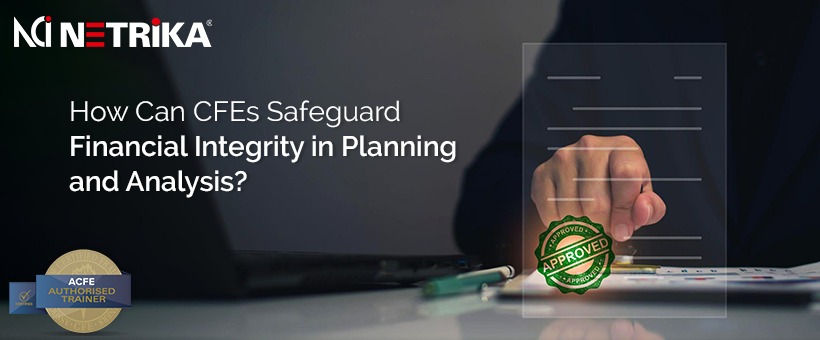News & Events
How Can CFEs Safeguard Financial Integrity in Planning and Analysis?
- March 20, 2024
- Posted by: marketing@netrika.com
- Category: Blogs

A certified fraud examiner is a professional who has successfully passed the CFE exam, meets all the educational as well as professional standard criteria laid down by ACFE (Association of Certified Fraud Examiners), and adheres to the code of conduct. It is the rigorous certified fraud examiner course and a comprehensive understanding of risk assessment, threat identification, investigation, and mitigation strategies as well as best practices, that make a certified fraud examiner adept at safeguarding financial integrity in planning and analysis.
In the financial sector, a certified fraud examiner holds the responsibility of vetting both internal and external financial transactions or records for indications of theft, embezzlement, or potential vulnerabilities. CFEs, also into possible cases of money laundering, insurance fraud, and other fraudulent cases by planning and analyzing financial data.
Here is how certified fraud examiners can secure financial integrity in planning and analysis
- Certified Fraud Examiners (CFEs) seek out factual data on fraudulent incidents that support the supporting documentation. They are trained to restore the fraudulent activity to an accurate timeline of events. They leverage their training to design a visual demonstration as part of planning and analysis and use it as a starting point for forensic accounting and fraud examination. They construct the entire timeline for understanding and displaying financial events, supported by data-driven evidence.
- Certified fraud examiners comb financial data for patterns and anomalies that can indicate fraud. They can assist auditors or other responsible employees in determining which parts of financial statements are most likely to include fraud and in developing appropriate audit procedures to reduce the likelihood of such incidents.
- CFEs are also responsible for designing effective fraud prevention strategies that reduce the likelihood of fraud in a company. The strategies include recommending changing internal controls, filling vulnerable gaps, leveraging forensic accounting techniques to gather and analyze evidence, promoting a culture of transparency and accountability, and organizing fraud awareness training for employees.
- CFEs also testify in court as objective, expert witnesses in fraud cases. They can provide testimony in court, elucidating complex financial data and helping the jury understand the fraud’s mechanism. CFEs are crucial to the financial sector’s integrity because they help identify, halt, and investigate fraud by leveraging data analytics capabilities. Their expertise in accounting, criminology, and law can help companies develop effective methods to prevent fraud and provide perceptive evaluations of a company’s financial performance.
For any organization, trust is the currency that keeps the financial system’s integrity and reputation intact, while robust planning and analysis secures its security posture from exploitation. Certified fraud examiners understand this critical aspect of any financial system and serve as watchful defenders for organizations through their proficiency in forensic accounting, fraud risk assessment, compliance, and risk education. They harness their risk assessment and investigation expertise and make use of cutting-edge technology to identify and mitigate fraudulent activity while designing preventative measures to safeguard financial institutions.

